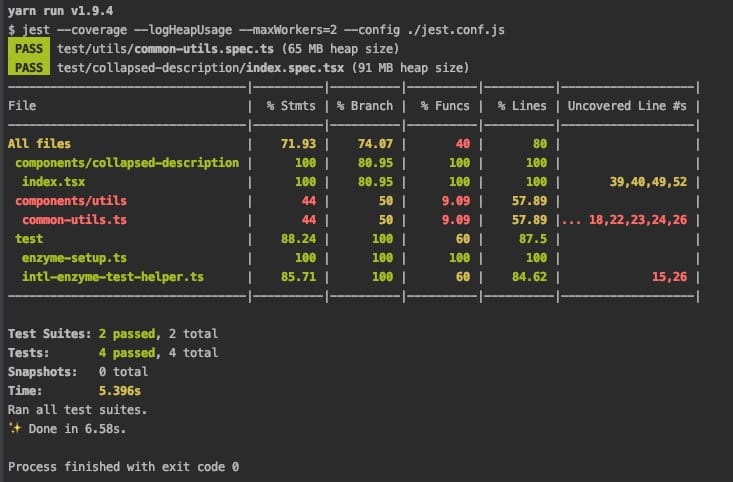Recently working on a company-level UI component library, for testing, decided to continue using Jest. Pursuing simplicity, decisively abandoned the copy-paste shortcut and configured from scratch. Documenting this here.

Understanding Concepts
Before playing, first understand what Jest does
Jest is a delightful JavaScript Testing Framework with a focus on simplicity. It works with projects using: Babel, TypeScript, Node, React, Angular, Vue and more!
The above is the official introduction, from which we know Jest is not just for React and JS.
Frontend Technology Stack
Listing the technology stack used in my frontend project:
- React
- TypeScript
- antd
So, based on this, let’s configure testing
Basic Configuration
package.json
Here only listing packages needed for UT installation:
{
"devDependencies": {
"@types/enzyme": "3.1.13",
"@types/jest": "23.3.1",
"enzyme": "3.5.0",
"enzyme-adapter-react-16": "1.3.0",
"identity-obj-proxy": "3.0.0",
"jest": "23.5.0",
"ts-jest": "23.1.4",
}
}
Function of Each Package
@types/**
TS definition files for required libraries
enzyme
A testing tool, note it can only be used for react
enzyme-adapter-react-16
Serves react component testing
identity-obj-proxy
Mock object, for example UT testing components might import images or less styles.
jest
Target testing framework, definitely need to install
ts-jest
Because we’re writing frontend projects with TS, so need to install this package. If we were writing frontend with JS, we could delete this package.
jest.conf.js
module.exports = {
transform: {
'^.+\\.tsx?$': 'ts-jest'
},
testMatch: ['<rootDir>/test/**/+(*.)+(spec.ts?(x))'],
coverageDirectory: '<rootDir>/test-results/',
testPathIgnorePatterns: ['<rootDir>/node_modules/'],
moduleFileExtensions: ['ts', 'tsx', 'js', 'jsx', 'json', 'node'],
globals: {
'ts-jest': {
tsConfigFile: './tsconfig.test.json'
}
},
moduleNameMapper: {
'\\.(less)$': 'identity-obj-proxy'
},
setupFiles: ['<rootDir>/test/enzyme-setup.ts']
};
script
{
"scripts": {
"test": "jest --coverage --logHeapUsage --maxWorkers=2 --config ./jest.conf.js"
}
}
- coverage is to display test code coverage information
- maxWorkers is to speed up UT execution time, this value is recommended not to be too large.
More configuration, see official website
About maxWorkers, you can see here
Key Configuration Points in Jest
- Because frontend components here import less files, module proxy is set up here.
- setupFiles is configured because I used enzyme for react component testing
Issues Encountered
test match 0
When actually running UT, initially found match was 0. The direct reason is Jest couldn’t find our test cases.

Solution is two points:
- Ensure testMatch path is correct
- Add moduleFileExtensions
Final Thoughts
After the above configuration, executing the test command will show the output results below. Of course, Jest configuration is much more extensive than shown here - this is just a simple starting point. Next is to gradually improve and enrich based on actual circumstances.

Although this is just a rough and brief introduction, I hope it can help everyone.

